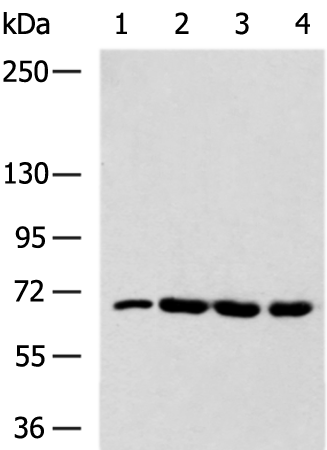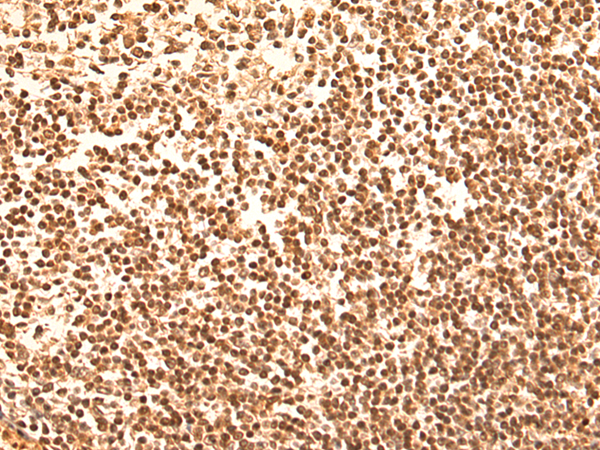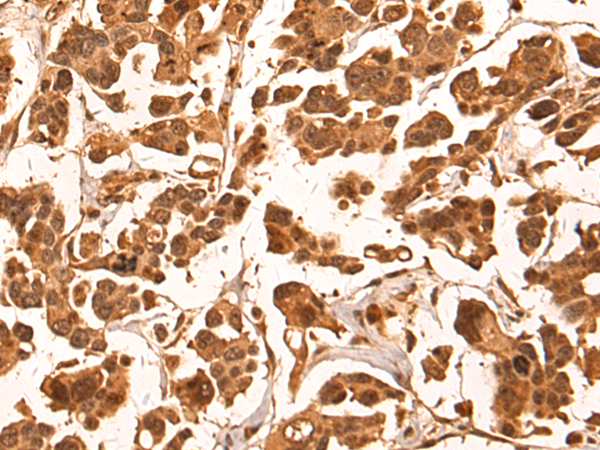


| WB | 咨询技术 | Human,Mouse,Rat |
| IF | 咨询技术 | Human,Mouse,Rat |
| IHC | 1/100-1/300 | Human,Mouse,Rat |
| ICC | 技术咨询 | Human,Mouse,Rat |
| FCM | 咨询技术 | Human,Mouse,Rat |
| Elisa | 1/5000-1/10000 | Human,Mouse,Rat |
| Aliases | RAP80; X2HRIP110 |
| WB Predicted band size | 79 kDa |
| Host/Isotype | Rabbit IgG |
| Antibody Type | Primary antibody |
| Storage | Store at 4°C short term. Aliquot and store at -20°C long term. Avoid freeze/thaw cycles. |
| Species Reactivity | Human |
| Immunogen | Fusion protein of human UIMC1 |
| Formulation | Purified antibody in PBS with 0.05% sodium azide and 50% glycerol. |
+ +
以下是关于UIMC1抗体的3篇参考文献及其摘要内容:
1. **文献名称**: *RAP80 targets BRCA1 to DNA damage foci*
**作者**: Sobhian B, et al. (2007)
**摘要**: 该研究利用UIMC1(RAP80)特异性抗体,发现RAP80通过与BRCA1的相互作用定位于DNA损伤位点,参与调控BRCA1在DNA双链断裂修复中的功能。
2. **文献名称**: *UIMC1 (RAP80) negatively regulates estrogen receptor activity by enhancing its ubiquitination*
**作者**: Kim H, et al. (2010)
**摘要**: 通过Western blot和免疫沉淀实验(使用UIMC1抗体),研究发现UIMC1通过促进雌激素受体(ER)的泛素化降解,抑制ER信号通路,可能在乳腺癌中具有抑癌作用。
3. **文献名称**: *Phosphorylation of UIMC1 by ATR is required for its interaction with BRCA1 and DNA repair*
**作者**: Yan J, et al. (2015)
**摘要**: 研究使用UIMC1抗体验证其磷酸化状态,发现ATR激酶介导的UIMC1磷酸化是BRCA1复合体募集至DNA损伤位点的关键步骤,影响同源重组修复效率。
4. **文献名称**: *UIMC1 as a potential prognostic biomarker in ovarian cancer*
**作者**: Cao L, et al. (2016)
**摘要**: 通过免疫组化(基于UIMC1抗体)分析卵巢癌组织,发现UIMC1低表达与患者预后不良相关,提示其作为预后标志物的潜力。
以上研究均涉及UIMC1抗体的应用,涵盖DNA修复机制、癌症信号通路及临床相关性分析。
The UIMC1 antibody targets the Ubiquitin Interaction Motif Containing 1 (UIMC1) protein, also known as RAP80 (Receptor-Associated Protein 80). UIMC1 is a key component of the DNA damage response (DDR) pathway, primarily involved in recognizing and repairing DNA double-strand breaks (DSBs). It functions as a scaffold protein that recruits repair factors to damage sites by binding to ubiquitinated histones through its ubiquitin-interacting motifs (UIMs). UIMC1 interacts with BRCA1 (Breast Cancer Type 1 Susceptibility Protein) as part of the BRCA1-A complex, which regulates homologous recombination repair (HRR) and maintains genomic stability. Dysregulation of UIMC1 has been linked to cancer progression, particularly in breast and ovarian cancers, due to its role in DDR and tumor suppression.
The UIMC1 antibody is widely used in research to study DNA repair mechanisms, cancer biology, and therapeutic responses. It enables detection of UIMC1 expression levels, localization, and post-translational modifications via techniques like Western blotting, immunofluorescence, and immunoprecipitation. Researchers also employ this antibody to explore UIMC1's involvement in chemoresistance, as impaired DDR pathways often correlate with treatment outcomes. Its role in modulating estrogen receptor signaling further highlights its relevance in hormone-driven cancers. By characterizing UIMC1's functions, the antibody contributes to understanding genomic instability in diseases and developing targeted therapies.
×